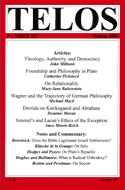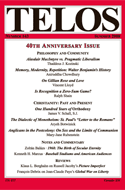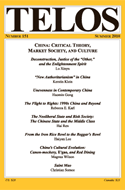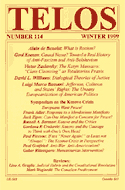By David Pan · Tuesday, August 10, 2010 Though his defense of National Socialism has earned him the reputation of being an ideologue, the most striking aspect of Carl Schmitt’s political career is the changeable nature of his political loyalties, in which he defended both Roman Catholicism and then the Weimar Republic before he came to ally himself with the Nazis. If a certain amount of opportunism may have also played a part in his decision-making, his promiscuity also testifies to a basic agnosticism in his political beliefs that is grounded in his theoretical approach to the notion of culture. Because this approach begins with a Nietzschean delegitimation of value systems with a universal and preordained claim to truth, Schmitt’s thinking develops as an attempt to understand politics in a multicultural world. His theories of decisionism and representation presume a world in which diverse value systems compete in order to establish the metaphysical foundations for order in a given time and place.
Continue reading →
By Danilo Breschi · Thursday, July 29, 2010 From the beginning of the 1960s to the end of the 1970s, Italian Communism—represented by the biggest Communist political party in the West—lost its propulsive force. The myth of “revolution” expired; the crucial social and economic role of the industrial working class disappeared; the capitalistic system consolidated itself as a mass consumerist society. In addition, there were important sociological changes in the leadership of the Italian Communist Party. First, we must specify who the Italian Communist militants were at the beginning, especially in the immediate years after World War II and in the first twenty years of the Republican period (1945-1965). During these years the Communist Party presented itself as an organization with a clearly defined identity and sense of purpose toward both outsiders and its own militants: the militant’s everyday life was dominated by the so-called “Stalinist metaphor” (“metafora staliniana,” a term coined by the Italian scholar Giuseppe Carlo Marino). What does that mean? To Communists, words such as “Stalin” and “USSR” signified an “ideal of absolute happiness, synthesis of moral standards and welfare, in opposition to the disturbing and corrupting promises of the American capitalism.”
Continue reading →
By Jennifer Wang · Tuesday, July 6, 2010 On Tuesdays at the TELOSscope blog, we reach back into the archives and highlight an article whose critical insights continue to illuminate our thinking and challenge our assumptions. Today, Jennifer Wang looks at Dominic Moran’s “Decisions, Decisions: Derrida on Kierkegaard and Abraham,” from Telos 123 (Spring 2002).
 In “Decisions, Decisions: Derrida on Kierkegaard and Abraham,” Dominic Moran attempts to use deconstructive critique on Derrida’s notion of decision as it is relevant to ethics, justice, and political responsibility. In particular, Moran’s is a critique of how practicable the sort of decision advanced by Derrida is, if at all. In the end, he concludes that it is not: a deconstructive ethics cannot even be considered paradoxical but rather is strictly contradictory in its relation of theory to practice. Moran sets Derrida’s engagement with politics in the aftermath of the de Man scandal and the ensuing criticism that deconstruction’s political possibilities tend toward nihilism and radical relativism. He is generous, however, in granting that Derrida is not entirely reactionary, for engagement with the political is the final stage in deconstruction’s development. In “Decisions, Decisions: Derrida on Kierkegaard and Abraham,” Dominic Moran attempts to use deconstructive critique on Derrida’s notion of decision as it is relevant to ethics, justice, and political responsibility. In particular, Moran’s is a critique of how practicable the sort of decision advanced by Derrida is, if at all. In the end, he concludes that it is not: a deconstructive ethics cannot even be considered paradoxical but rather is strictly contradictory in its relation of theory to practice. Moran sets Derrida’s engagement with politics in the aftermath of the de Man scandal and the ensuing criticism that deconstruction’s political possibilities tend toward nihilism and radical relativism. He is generous, however, in granting that Derrida is not entirely reactionary, for engagement with the political is the final stage in deconstruction’s development.
Continue reading →
By Lev Marder · Tuesday, June 22, 2010 On Tuesdays at the TELOSscope blog, we reach back into the archives and highlight an article whose critical insights continue to illuminate our thinking and challenge our assumptions. Today, Lev Marder looks at Aniruddha Chowdhury’s“Memory, Modernity, Repetition: Walter Benjamin’s History,” from Telos 143 (Summer 2008).
 Reaching into the Telos archive to retrieve Aniruddha Chowdhury’s essay “Memory, Modernity, Repetition: Walter Benjamin’s History” proves to be a troubling task. In the article, Chowdhury masterfully treats Benjamin’s concept of history, which I prefer to an extent to conflate with historiography. The more attentively one reads Chowdhury’s work, the more apparent it becomes that it resists being mundanely archived and treated just as another artifact. Sticking out of the archive, it also defies the reader who wonders where to start reading the text. Accustomed to starting from the beginning, the reader rarely questions the method of reading, the method of interpreting, and the mode of historiography. Without a doubt these questions relate to the (mis)understanding of temporality and its limits. Reaching into the Telos archive to retrieve Aniruddha Chowdhury’s essay “Memory, Modernity, Repetition: Walter Benjamin’s History” proves to be a troubling task. In the article, Chowdhury masterfully treats Benjamin’s concept of history, which I prefer to an extent to conflate with historiography. The more attentively one reads Chowdhury’s work, the more apparent it becomes that it resists being mundanely archived and treated just as another artifact. Sticking out of the archive, it also defies the reader who wonders where to start reading the text. Accustomed to starting from the beginning, the reader rarely questions the method of reading, the method of interpreting, and the mode of historiography. Without a doubt these questions relate to the (mis)understanding of temporality and its limits.
Continue reading →
Telos 151 (Summer 2010), a special issue on China, is now available for purchase. Click here to order.
 In this issue, Telos turns its attention to China and a set of diverse encounters between Critical Theory and contemporary Chinese society and culture. Recent issues of the journal have focused on various theoretical or thematic topics, in order to explore aspects of particular conceptual problems. The alternative editorial choice, evidenced here, to organize a discussion of a single country has, frankly, been rare in the history of Telos. When all is said and done, theory can have a hard time focusing on a particular case and its materiality, rather than trying to deduce an account of an abstract problem from some internal logic. Therefore the decision to organize a collection of essays defined in this way—the China issue—has epistemological consequences and poses questions regarding the relationship between theory and its material object. This choice also invites a certain heterogeneity of perspectives, in terms of both methods and values. At stake here is less the internal consistency of theoretical paradigms than the agility of addressing the complex and inconsistent movements—changes, breaks, fragments, returns, developments—in the aggregate of experiences circumscribed by the name of the empirical place. Those experiences and that place, moreover, should also call the purist presumptions of theory into question or at least allow for scrutinizing implicit ideological commitments. Theory cannot be oblivious to the particularities of historical experience: so Telos turns to China. Nor however can experience evade examination by Critical Theory. In this issue, Telos turns its attention to China and a set of diverse encounters between Critical Theory and contemporary Chinese society and culture. Recent issues of the journal have focused on various theoretical or thematic topics, in order to explore aspects of particular conceptual problems. The alternative editorial choice, evidenced here, to organize a discussion of a single country has, frankly, been rare in the history of Telos. When all is said and done, theory can have a hard time focusing on a particular case and its materiality, rather than trying to deduce an account of an abstract problem from some internal logic. Therefore the decision to organize a collection of essays defined in this way—the China issue—has epistemological consequences and poses questions regarding the relationship between theory and its material object. This choice also invites a certain heterogeneity of perspectives, in terms of both methods and values. At stake here is less the internal consistency of theoretical paradigms than the agility of addressing the complex and inconsistent movements—changes, breaks, fragments, returns, developments—in the aggregate of experiences circumscribed by the name of the empirical place. Those experiences and that place, moreover, should also call the purist presumptions of theory into question or at least allow for scrutinizing implicit ideological commitments. Theory cannot be oblivious to the particularities of historical experience: so Telos turns to China. Nor however can experience evade examination by Critical Theory.
Continue reading →
By Timothy Stacey · Tuesday, June 1, 2010 On Tuesdays at the TELOSscope blog, we reach back into the archives and highlight an article whose critical insights continue to illuminate our thinking and challenge our assumptions. Today, Timothy Stacey looks at Peter Schneider’s “Intervention in Kosovo,” from Telos 115 (Spring 1999), and Gábor Rittersporn’s “Humanitarian Intervention?” from Telos 114 (Winter 1999).
 As NATO operations in Iraq whittle down to a bare minimum and debate rages on over the worth of continued involvement in Afghanistan, it is worth reflecting on the arguments surrounding the initial intervention. So some media pundits argue. The problem many had with the intervention in Iraq and continue to have with the intervention in Afghanistan is that they very quickly departed from the initial objectives conveyed to the public, becoming campaigns with no clear mission and no end in sight. Foul play is suspected. The (non)intervention in Kosovo and Rwanda helps to clarify this point. Kosovo was a clear case of humanitarian intervention at its most black and white. The military option was a last resort and when used was proportional. Likewise, Rwanda provides a black-and-white example at the opposite end of the spectrum: clearly military intervention was missed. To summarize: Kosovo and Rwanda clear, Iraq and Afghanistan not so clear. As NATO operations in Iraq whittle down to a bare minimum and debate rages on over the worth of continued involvement in Afghanistan, it is worth reflecting on the arguments surrounding the initial intervention. So some media pundits argue. The problem many had with the intervention in Iraq and continue to have with the intervention in Afghanistan is that they very quickly departed from the initial objectives conveyed to the public, becoming campaigns with no clear mission and no end in sight. Foul play is suspected. The (non)intervention in Kosovo and Rwanda helps to clarify this point. Kosovo was a clear case of humanitarian intervention at its most black and white. The military option was a last resort and when used was proportional. Likewise, Rwanda provides a black-and-white example at the opposite end of the spectrum: clearly military intervention was missed. To summarize: Kosovo and Rwanda clear, Iraq and Afghanistan not so clear.
Continue reading →
|
|
 In
In  Reaching into the Telos archive to retrieve Aniruddha Chowdhury’s essay “Memory, Modernity, Repetition: Walter Benjamin’s History” proves to be a troubling task. In the article, Chowdhury masterfully treats Benjamin’s concept of history, which I prefer to an extent to conflate with historiography. The more attentively one reads Chowdhury’s work, the more apparent it becomes that it resists being mundanely archived and treated just as another artifact. Sticking out of the archive, it also defies the reader who wonders where to start reading the text. Accustomed to starting from the beginning, the reader rarely questions the method of reading, the method of interpreting, and the mode of historiography. Without a doubt these questions relate to the (mis)understanding of temporality and its limits.
Reaching into the Telos archive to retrieve Aniruddha Chowdhury’s essay “Memory, Modernity, Repetition: Walter Benjamin’s History” proves to be a troubling task. In the article, Chowdhury masterfully treats Benjamin’s concept of history, which I prefer to an extent to conflate with historiography. The more attentively one reads Chowdhury’s work, the more apparent it becomes that it resists being mundanely archived and treated just as another artifact. Sticking out of the archive, it also defies the reader who wonders where to start reading the text. Accustomed to starting from the beginning, the reader rarely questions the method of reading, the method of interpreting, and the mode of historiography. Without a doubt these questions relate to the (mis)understanding of temporality and its limits.  In this issue, Telos turns its attention to China and a set of diverse encounters between Critical Theory and contemporary Chinese society and culture. Recent issues of the journal have focused on various theoretical or thematic topics, in order to explore aspects of particular conceptual problems. The alternative editorial choice, evidenced here, to organize a discussion of a single country has, frankly, been rare in the history of Telos. When all is said and done, theory can have a hard time focusing on a particular case and its materiality, rather than trying to deduce an account of an abstract problem from some internal logic. Therefore the decision to organize a collection of essays defined in this way—the China issue—has epistemological consequences and poses questions regarding the relationship between theory and its material object. This choice also invites a certain heterogeneity of perspectives, in terms of both methods and values. At stake here is less the internal consistency of theoretical paradigms than the agility of addressing the complex and inconsistent movements—changes, breaks, fragments, returns, developments—in the aggregate of experiences circumscribed by the name of the empirical place. Those experiences and that place, moreover, should also call the purist presumptions of theory into question or at least allow for scrutinizing implicit ideological commitments. Theory cannot be oblivious to the particularities of historical experience: so Telos turns to China. Nor however can experience evade examination by Critical Theory.
In this issue, Telos turns its attention to China and a set of diverse encounters between Critical Theory and contemporary Chinese society and culture. Recent issues of the journal have focused on various theoretical or thematic topics, in order to explore aspects of particular conceptual problems. The alternative editorial choice, evidenced here, to organize a discussion of a single country has, frankly, been rare in the history of Telos. When all is said and done, theory can have a hard time focusing on a particular case and its materiality, rather than trying to deduce an account of an abstract problem from some internal logic. Therefore the decision to organize a collection of essays defined in this way—the China issue—has epistemological consequences and poses questions regarding the relationship between theory and its material object. This choice also invites a certain heterogeneity of perspectives, in terms of both methods and values. At stake here is less the internal consistency of theoretical paradigms than the agility of addressing the complex and inconsistent movements—changes, breaks, fragments, returns, developments—in the aggregate of experiences circumscribed by the name of the empirical place. Those experiences and that place, moreover, should also call the purist presumptions of theory into question or at least allow for scrutinizing implicit ideological commitments. Theory cannot be oblivious to the particularities of historical experience: so Telos turns to China. Nor however can experience evade examination by Critical Theory.  As NATO operations in Iraq whittle down to a bare minimum and debate rages on over the worth of continued involvement in Afghanistan, it is worth reflecting on the arguments surrounding the initial intervention. So some media pundits argue. The problem many had with the intervention in Iraq and continue to have with the intervention in Afghanistan is that they very quickly departed from the initial objectives conveyed to the public, becoming campaigns with no clear mission and no end in sight. Foul play is suspected. The (non)intervention in Kosovo and Rwanda helps to clarify this point. Kosovo was a clear case of humanitarian intervention at its most black and white. The military option was a last resort and when used was proportional. Likewise, Rwanda provides a black-and-white example at the opposite end of the spectrum: clearly military intervention was missed. To summarize: Kosovo and Rwanda clear, Iraq and Afghanistan not so clear.
As NATO operations in Iraq whittle down to a bare minimum and debate rages on over the worth of continued involvement in Afghanistan, it is worth reflecting on the arguments surrounding the initial intervention. So some media pundits argue. The problem many had with the intervention in Iraq and continue to have with the intervention in Afghanistan is that they very quickly departed from the initial objectives conveyed to the public, becoming campaigns with no clear mission and no end in sight. Foul play is suspected. The (non)intervention in Kosovo and Rwanda helps to clarify this point. Kosovo was a clear case of humanitarian intervention at its most black and white. The military option was a last resort and when used was proportional. Likewise, Rwanda provides a black-and-white example at the opposite end of the spectrum: clearly military intervention was missed. To summarize: Kosovo and Rwanda clear, Iraq and Afghanistan not so clear. 

